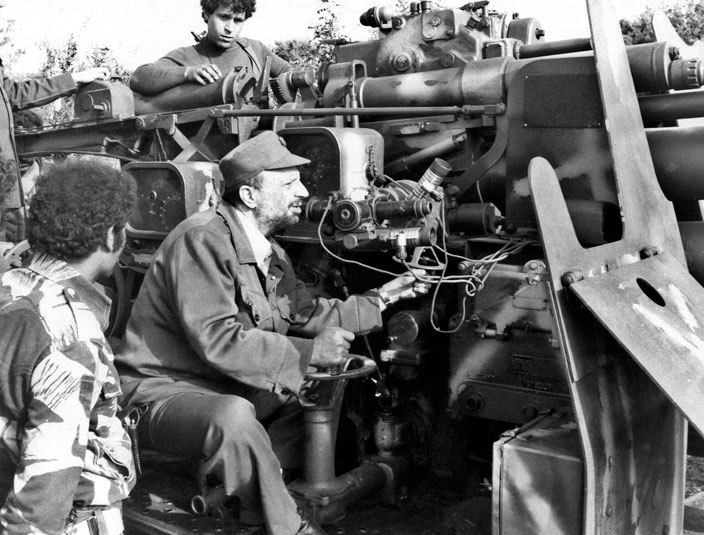May 7, 1983
In the throes of war against Israel in Lebanon, five senior Palestine Liberation Organization officers, led by Col. Abu Musa, declare an armed revolt against military factions under PLO Chairman Yasser Arafat’s leadership. At the time, Arafat is in exile with other PLO leaders in Tunis after the Israeli invasion of Lebanon in June 1982; Arafat and the others remain in Tunisia until the Oslo Accords of 1993. Arafat maintains control over military and political decision-making in Lebanon.
Abu Musa’s stated grievances relate to Arafat “neglecting the armed struggle against Israel in favor of negotiating with Jordan over how to further President Reagan’s initiative for a Middle East settlement.” The rebels say Arafat is siding with an American peace plan that would not provide Palestinians with an independent state, but rather an entity within the West Bank as part of a confederation with Jordan.
The short-lived uprising does not change the PLO leadership or its public policies but does highlight internal tensions. Factions are increasingly challenging Arafat and the PLO’s self-proclaimed role as “the sole and legitimate representatives of the Palestinian people.”
Lebanon is the home to hundreds of thousands of Palestinian refugees in camps in Lebanon, and Palestinian guerrilla groups began making their way into Lebanon in the 1960s. They used southern Lebanon as a stronghold for protection and recruits to fight Israel. In 1969, Egyptian President Gamal Abdel Nasser brokered the Cairo Agreement between the commander of the Lebanese army, Gen. Emile Boustany, and Arafat. The agreement gave the PLO authority over the Palestinian refugee camps in Lebanon and ostensible autonomy for military factions operating in the south of the country. As a result, the PLO essentially established an autonomous Palestinian political entity within Lebanon. The PLO built military bases in Lebanon and conducted attacks from there against Israel.
In 1970, King Hussein of Jordan expelled all members of the PLO as a result of a bloody power struggle between Arafat and the Hashemite kingdom. Lebanon then became an even bigger refuge for the PLO and the epicenter of Palestinian radicalism and armed struggle against Israel. On June 6, 1982, in response to prolonged Palestinian guerrilla attacks from southern Lebanon, Israel launched a full-scale invasion into Lebanon to wipe out PLO strongholds. The war caused upheaval in an already politically fractured Lebanon, which had been in a state of civil war since 1975. The PLO was an active participant in the civil war.










